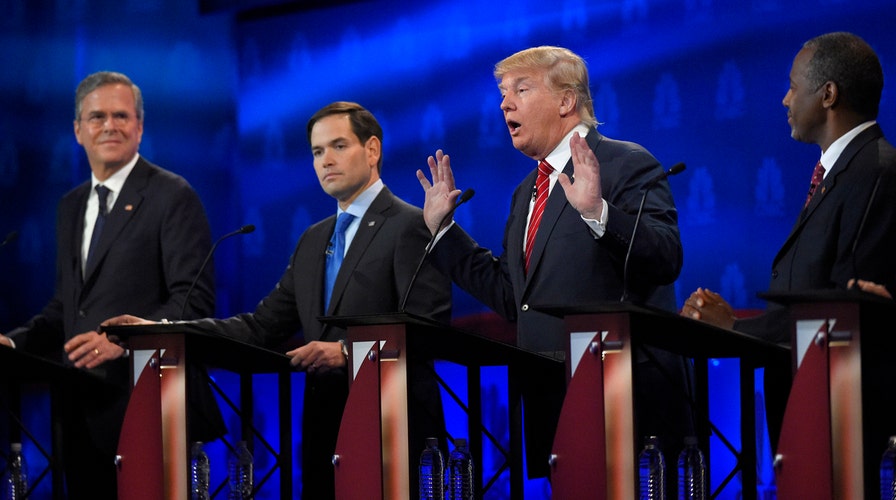Who will sink and who will swim in FBN GOP debate
Strategy Room: Stephen Sigmund and Brian Morgenstern predict moderators will focus on substantive questions and making sure the candidates answer them
Here’s one way to look at this week's Republican presidential debates, to be aired live Tuesday night from Milwaukee on the Fox Business Network:
The debates may offer less. They may also offer more.
How so?
The FBN debate at 9 pm ET, co-hosted by the Wall Street Journal, features the fewest candidates so far on a prime time stage – eight, down from ten in last month’s now-infamous CNBC debate.
We don't know what the viewing audience for this debate will be, as Fox Business reaches about 11 million fewer homes than CNBC (with 24 million viewers, the first GOP debate was the highest-rated broadcast in the history of the Fox News Channel, just as CNN and CNBC had record-setting evenings).
It’s worth noting that we’re within 11 weeks of the first vote in Iowa and the presidential race lacks a candidate tapping into economic uncertainty in a signature manner.
But here's where this debate may one-up its predecessors: by pulling off an adult conversation. In that regard, think of Milwaukee as a Boulder mulligan – a sober do-over on taxes, commerce and government that CNBC promised but failed to deliver.
Here are three angles worth noting, if you plan to keep a scorecard on Tuesday night:
1. The Maturity Test
To the adage that “saints have no moderation”… can moderators be saintly? Given the outcry over CNBC’s line of questioning, let’s see if FBN’s team can stick to the script and keep the conversation along economic themes as advertised.
The three previous three GOP debates left many of the candidates unhappy with the choice of questions. For Republicans, will the fourth time be the charm?
There’ll be a temptation to go off-subject: Ben Carson’s alleged biographical inconsistencies; Donald Trump’s “Saturday Night Live” gig; yet another Jeb Bush rebranding. But if the post-debate analysis centers on the substance of what the candidates said, not on how various people misbehaved, then the “littlest” debate may be the one that achieves the highest stature.
2. The Obama/Hillary Factor
It was two Democrats who had a good night the last time the Republican hopefuls gathered: President Obama and Hillary Clinton. That’s because the candidate-moderator sparring took the focus away from economic angst – a sentiment key to the GOP strategy for retaking the White House next year.
Last week, the federal government reported that 271,000 jobs were added to the U.S. economy in October; and unemployment fell to a seven-year low of 5 percent. As for the electorate feeling it, it’s a Prozac nation. Per this USC Dornsife/Los Angeles Times poll released over the weekend, 70 percent of respondents think the country is on the wrong track.
The eight GOP debaters need to explain why.
One line of attack for them to consider: Mrs. Clinton’s promise to “rein in the excess of capitalism”. Aside from the obvious hypocrisy (capitalism ain’t so bad when you and your spouse are paid $25 million for giving a little over 100 speeches), it’s an opening for the GOP to rebrand itself as the party of growth and opportunity.
Put another way: in order to win a first term, the Republican nominee needs to shape the race as a third Obama term – and warn voters to expect a Clintonian diet of higher taxes, more regulation and less trust in entrepreneurs.
3. The Separation Factor
We have GOP presidential candidates trying to corner the market on brashness (Trump, Carly Fiorina, Ted Cruz, Chris Christie). Still others strive to be non-conformists – Carson, with no political experience; Marco Rubio, at age 44, a generation younger than the typical Republican nominee in the Reagan-Romney era.
However, no Republican contender claims the mantle of “the jobs candidate.” Maybe that changes Tuesday night in Milwaukee.
Rubio and Bush have traditional tax-cut plans – what one might expect of campaigns flush with big-brained economists. Cruz, Carson and Rand Paul all favor a flat tax, whose DNA can be traced back 20 years to Steve Forbes’ presidential campaign.
But is that the same as selling America on a vision of kicking the economy into a higher gear? Yes, some economic conditions differ from 2012 – most notably, unemployment. Then again, with a labor-participation rate sitting at a four-decade low, the economy should be a target-rich environment for the party out of power.
It’s worth noting that we’re within 11 weeks of the first vote in Iowa and the presidential race lacks a candidate tapping into economic uncertainty in a signature manner. Various contenders play around the edges – balancing the federal budget, revamping Social Security, easing the middle-class squeeze – but the hunt’s on for the one Republican who can distill the angst into something as simple as “are you better off today than you were four years ago?”
Solve that riddle and one of the Republicans on the stage in Milwaukee has a good shot at winning the night – and the bigger prize less than a year from now.

